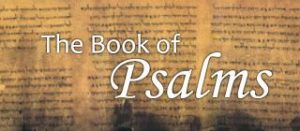
What I’d Like You to Remember about the Psalms
I hope you’ve enjoyed studying the Book of Psalms this Lent. If you missed any of the messages they’re available on our web site. Here’s a summary of what we covered:
The Book of Psalms was the hymnal & prayer book of the Israelites. There are 150 psalms in the collection, broken into five books, each of which ends in a psalm of praise. They were used in communal worship in the temple and synagogues, as well as by individuals in personal prayer. They were written between the 15th Century BC (the Exodus) and the 6th Century BC (the Babylonian Exile).
The psalms were the Israelites’ response to God. For the five books of the Torah, God spoke to the people. The five books of the psalms were their response.
The psalms are “language we can borrow” to speak with God. They offer us prayers, sentences, phrases and images, all of which we can utilize in our prayers.
The psalms are a beautiful example of ancient Hebrew poetry. Their primary literary feature is “poetic parallelism,” where two sentences or phrases are paired together, with the second phrase adding to the meaning of the first.
The psalms cover the entire spectrum of human emotion, including the desire for revenge (“imprecatory psalms”). Remember, the Israelites were often uncertain about eternal life. So if God is a God of justice, God had better make things right here and now, instead of sorting it out later in the afterlife. Also, perhaps the message of these harsh psalms is that our anger and hatred is to be prayed about, not acted upon!
There are various types of psalms – psalms of praise, teaching psalms, wisdom psalms, psalms of faith, psalms of confession, psalms of ascent (sung on the journey to the temple), royal psalms to honor the king and laments.
The most common psalms in the collection are laments. 60 out of 150. This is one of the biggest reasons why we need the psalms and the Old Testament. The New Testament does not include laments, and therefore doesn’t give us the language and permission that the laments do to address our strongest emotions and deepest cries for help to God.
Pastor Rich Knight Lent 2018
The Psalms
Israel’s Prayer Book and Ours

There are Five Books of Psalms. Each one ends in a Doxology
I Psalms 1-41 (use “Yahweh,” LORD)
II Psalms 42-72 ( use “Elohim” = God)
III Psalms 73-89
IV Psalms 90-106
V Psalms 107-150
The Title of the Book:
In Hebrew Old Testament – “Tehillim” = “Praises”
In Greek Old Testament – “Psalms” = songs accompanied by stringed instruments
Written over many years:
Psalm 90 – A Psalm of Moses (1400s BC)
Psalm 137 – During the Babylonian Captivity (500s BC)
Half of the Psalms are attributed Red ADIDAS Originals x Thebe Magugu ADIDAS Originals - SchaferandweinerShops Italy - adidas deconstructed tracksuit dress code boys Custom MSCHF x INRI Nike Air Max 97 Jesus Shoes , Cheap Poligo Jordan Outlet , nike air 270 cheap nike air max 270 white navy blue to David. (controversial)
Characteristics of Hebrew Poetry
No rhyme or regular meter
Passionate & emotional – Psalm 10, 22
Vivid & Concrete Images – Shepherd, rock, Fortress
Simile & Metaphors – God is like . . .
Repetition & Refrains – Psalms 42 and 46
Poetic Parallelism – the echo adds to the first statement. Psalm 19
Symmetry – same # of lines in each stanza, Psalms 33 and 41
Types of Psalms
Praise & Thanksgiving Laments (more than 60!)
Songs of Trust Confession Wisdom/Teaching Psalms
Sacred History / Holy History Psalms Imprecatory
Individual Prayers & Prayers for the Community Songs of Zion / Royal Psalms
Instruments used when the Psalms were first sung: harp, flute, horn (ram’s horn), trumpet, drum, cymbals!
The Apostle Paul urged Christians to sing the Psalms – Eph. 5:19 and Col. 3:16
Three Basic Benefits of the Psalms;
- They are a guide to worship. They give us opportunities to speak to God in words God inspired others to speak in the past.
- They demonstrate by example how we can relate honestly to God.
- They demonstrate the importance of reflection and meditation, and invite us to prayer.
Things to look for when reading the Psalms
Take note of the introductory words for author and context. Some of them give the setting of the psalm, the event that inspired the prayer. Most do now however, allowing us to insert our own context, our own hopes and hurts, fears and dreams.
Don’t worry about the words to the musicians! Ex. “Selah” is found 71 times. Probably meant a pause or a musical interlude.
“Listen” for rhythms, parallelism, and refrain. Ex. Psalm 46: “The Lord of Hosts is with us. The God of Jacob is our refuge.” – repeated in vss. 7 & 11.
Be careful not to make a doctrine out of an emotional prayer. The psalms often reveal theology (some good, some not so good), but they do not set out to teach it. For example, in Ps. 51:5 David prays: “Indeed, I was born guilty, a sinner when my mother conceived me.” The psalm is NOT teaching that babies are sinful from the moment of conception. The Bible does not teach that. David is simply expressing his deep sense remorse for his sins (Bathsheba & Uriah).
Watch for the shift in the psalms, from struggle to praise.
Psalm 42: “Why are you cast down, O my soul, and why are you disquieted within me? Hope in God; for I shall again praise him, my help and my God.”
“It is impossible to think of any human circumstances which do not find expression in this book. It is intensely human. The deepest thing is that it is a collection of songs in which human experiences are brought into the presence of God. They show how man feels and thinks and speaks and acts when he is conscious of God.” – – Campbell Morgan
“Wherever the Psalter is abandoned, an incomparable treasure vanishes from the Christian church. With its recovery will come unsuspected power.” Dietrich Bonhoeffer
Psalms for Lent! – A Book a Week

Below is a reading plan for the Book of Psalms.
In the Bible the 150 Psalms are divided into 5 books, each ending in praise.
How about reading a book a week?
The psalms suggested were chosen for their beauty & variety,
giving the reader a sampling of the different types of psalms.
Book I
Psalms 1-41
Psalm 1 – A Wisdom Psalm
Showing us where wisdom is found
Ps. 8 – How majestic is your name
Ps. 19 – note the rhythm & parallelisms, repeating a statement in a slightly different way
Note Ps. 22 & Ps. 23 back to back!
Ps. 27 – to behold the beauty of the Lord
Pss. 3-7, 13 & 22 – the emotional “laments,” there are more laments (approx.. 60) than any other type of psalm!
Psalm 32 – David’s Confession
Book II
Psalms 42-72
Ps. 42 – a classic lament – Why are you downcast, O my soul
Ps. 46 – Be still and know that I am God
Ps. 51 – David’s confession, create in me a clean heart
Pss.54 – 57 – God, Help!
Ps. 58 – ugly vengeance
Ps. 63 – your steadfast love is better than life
Ps. 72 – a prayer for the king, a Royal Psalm
Book III
Psalms 73-89
Ps. 74 – Why God?
Ps. 77 & 78 – recalling sacred history
Ps. 84 – in praise of worship in God’s House
Ps. 89 – celebrating God’s covenant
Book IV
Psalms 90-106
Ps. 90 – A Psalm of Moses (1450 BC)
Ps. 91 – in the shelter of the Most High
Pss.95 – 101 – Sing to the Lord a new song
Ps. 103-104 – Bless the Lord O My Soul
Ps. 105-106 – teaching sacred history
Book V
Psalms 107-150
109 – Do not be silent, O God
Ps. 113 – God, the helper of the needy travis scott air jordan 1 retro low og black olive release date fall 2024 jordan 1 mid linen
Ps. 119 – the longest Psalm, Thy Word is a lamp
Ps. 121 – I lift up my eyes to the hills
Pss. 121-134 – songs of ascents, sung along the journey to the temple in Jerusalem
Ps. 136 – a responsive, liturgical psalm
Ps. 137 – written in exile, by the rivers of Babylon (586 BC)
Ps. 139 – beautiful poetry
Pss. 146-150 the collection ends in pure praise!
Poetic Parallelism in the Psalms
The primary feature of Hebrew poetry!
In “Poetic Parallelism” the first line is balanced with a second line, which serves to illuminate the first. It does so in one of three ways:
- Sometimes the second line echoes the same theme in slightly different language:
The earth belongs to the Lord and everything in it,
the world and those who dwell therein. Ps. 24:1
- Or, the second line strengthens an affirmation by contrasting it with the opposite:
For the Lord knows the way of the righteous,
but the way of the wicked will perish. Ps. 1:6
- Or, the second line continues the thought by ascending toward its completion:
For Yahweh is a great God,
and a great King transcending all gods. Ps. 95:3
Bernhard W. Anderson in Out of the Depths: The Psalms Speak for Us Today,
pp.34-35
The Lament Psalms

3, 6, 10, 12, 13, 22, 31, 35, 41, 42, 51, 54-57,
61, 74, 79, 86, 88, 102, 105, and others.
Five Observations from the Laments
These Prayers of the Bible teach us:
It’s okay to be angry with God.
It’s okay to question, doubt, and wrestle with God.
It’s necessary to face our brokenness, our human-ness.
Honest-to-God prayers are the stuff that faith is made of.
Prayer changes us.
